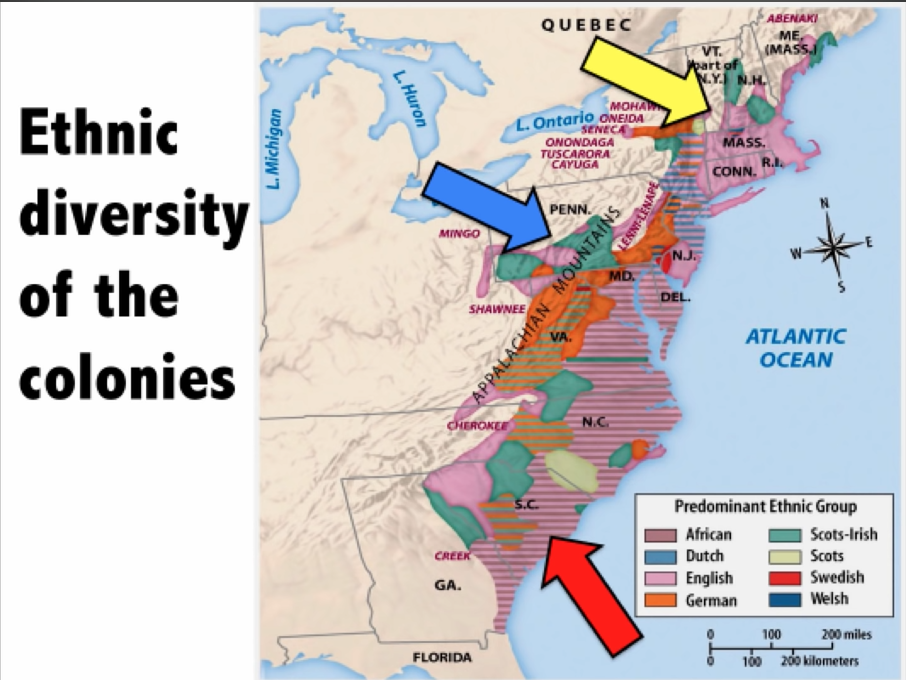American Pageant Chapter 4-5 APUSH Review (APUSH Period 2)
Key Point: Regional differences existed between the British colonies:
Reasons for Differences
- Who came
- Why they came
- Environmental &geographic variations (climate, natural resources, etc)
Make sure to know about the Chesapeake vs New England Life
New England Colonies
- Puritan religious motives for colonization
- Close-knit homogeneous society (settlements centered around towns)
- Importance of religion, family, and education (schools required)
- Town Hall meetings (adult male church members)
- Received large number of immigrants & high birthrate
- Mixed economy: agriculture, trade, shipbuilding
Southern Plantation Colonies
- Male dominated society, warmer climate, harsh life, Iower birth rate Defined hierarchy of wealth & status (southern gentry)
- Cash crop plantation economy
- Few cities develop
- Labor system: indentured servants to slavery (Especially after Bacon's Rebellion)
- Reasons for transition to slavery: 1) abundance of land 2) shortage of indentured servants 3) no wat to enslave native population 4) European demand for colonies goods
- Majority slave population in South Carolina
Slavery in Colonies America
- Triangular trade (3 part trade route): Slaves and goods moving from Africa, the Caribbean, and the colonies
- The journey from Africa to the Western Hemisphere was known as the "Middle passage"
- Slave culture: Blend of African and American cultures
- Variety of tribes from different parts of Africa
- Stono Uprising, 1739 South Carolina: one of the few slave revolts in colonial America
- Tried to get to Spanish Florida where they were promised freedom
- Rebellion was defeated and contributed to stricter laws regulating slaves
- Most common resistance to slavery: work slowdowns, running away, fake illness. etc.
Religion in the Colonies
- Religious passion was fading in the New England colonies
- Half Way Covenant (1662): individuals could become partial church members even if did not have a conversion
- Religious freedom?
- The Massachusetts Bay colony DID NOT allow freedom of religion
- Some religious toleration existed in a few British colonies
- Pennsylvania: Quakers!
- Rhode Island: Separation of church and state
- Maryland- only to Christians
- Salem Witch Trials: Salem, Massachusetts 1692
- 19 people hung and 1 pressed to death
- Reflect growing tension over the changing nature of the colony (religious to profit driven commercialism)
Great Awakening
- Great Awakening was a religious revival in the 1730-40s that spread throughout the colonies
- Many people convert
- Jonathan Edwards: "Sinners in the Hands of Angry God"
- George Whitefield: Introduced a new energized style of evangelica l preaching
- New Lights (supporters) vs. Old Lights (against)
- IMPACTS: New Universities formed (Dartmouth, Princeton, Brown, etc.)
- Greater religious independence & diversity (new churches formed)
- Strengthened calls for separation of church & state
- 1st mass movement shared amongst Colonists
Mercantilism
- Various mercantile laws were passed to regulate colonial trade and to benefit England (Navigation Acts, Molasses Act)
- The goals and interests of European leaders at times diverged from those of colonial citizens
- But salutary neglect (relative indifference to colonial governance)
- Good: Colonial shipbuilding developed (especially in New England colonies),
- provided protection of the British military
- Provided Chesapeake tobacco a monopoly in England
- Bad: Restricted development of colonial manufacturing
- Had to buy higher priced manufactured goods from England
- Farmers had to accept lower prices for their enumerated crops
- England attempted to integrate the colonies into a coherent, hierarchical imperial structure: Dominion of New England (1686)
- Glorious Revolution (1688) led to the overthrow of James II (William and Mary take the throne)
- Limits power of the monarchy
- Colonists rebel against the Dominion of New England
- Big Turning Point: 1763 End of the Seven Years War
Colonial Politics
Gradual development of democratic institutions in the colonies & colonial experiences with self-government
- Examples: Mayflower Compact, Town Hall Meetings, House of Burgesses, elected representative assemblies, etc.
Many people still excluded (property or religious qualifications) and England ultimately was still in charge
Zenger case (1733): advanced freedom of the press
- John Peter Zenger printed a newspaper critical of the royal governor in New York
- Charged with libel> jury ruled NOT GUILTY
- Could be critical of elected officials if the statements were true
